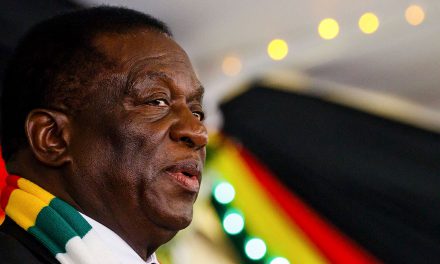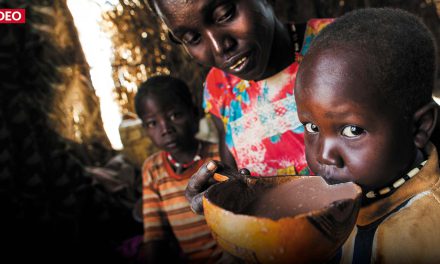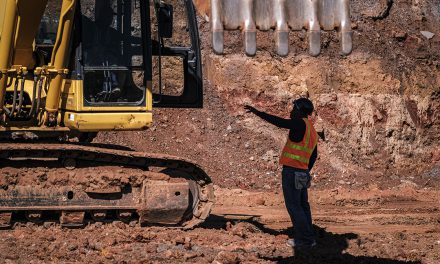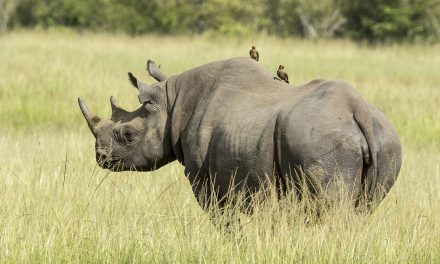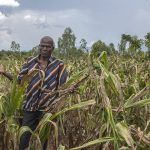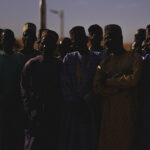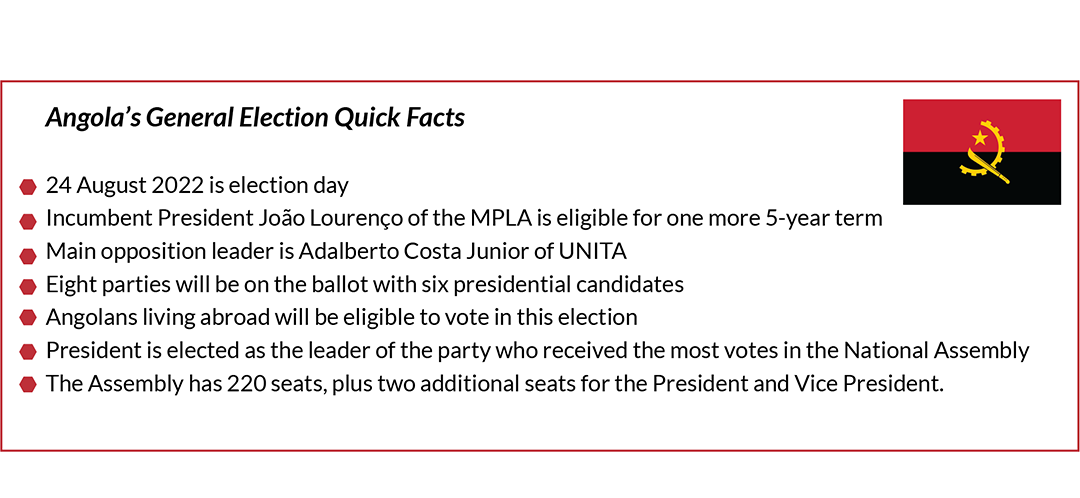 Introduction
Introduction
Political commentators predict that the Angolan 2022 electoral contest is set to be one of its most competitive yet. Opposition parties hope to address grievances like unemployment, poverty, inadequate housing, and public services in electoral votes this election cycle. In the last election held in 2017, the Movimento Popular de Libertação de Angola (MPLA) won 150 seats in Parliament, while União Nacional para a Independência Total de Angola (UNITA) got 51, and the Convergência Ampla de Salvação de Angola (CASA-CE) coalition secured the remaining 16 seats. The ruling party, the MPLA, seems more divided as a result of President João Lourenço taking a harder stance on issues related to corruption and nepotism within the party. Lourenço’s actions were welcomed by the public and international partners, but have caused divisions amongst his fellow MPLA members who were close to the late president José Eduardo dos Santos.
For the first time, Angolans living abroad will be eligible to vote and recent data collected by Angola’s National Electoral Commission estimate an additional five million voters this election cycle. In 2017, around nine million voters registered, whereas this election has an estimated 14 million registered to vote. According to a recent Afrobarometer survey, the number of Angolans expected to vote for UNITA has increased since 2019, narrowing the gap between the two main parties to just seven percentage points. For the first time, young Angolans who were born after the civil war, which ended in 2002, will have their chance to cast their votes. The youth aged 0-24 years old make up 62% of the Angolan population.
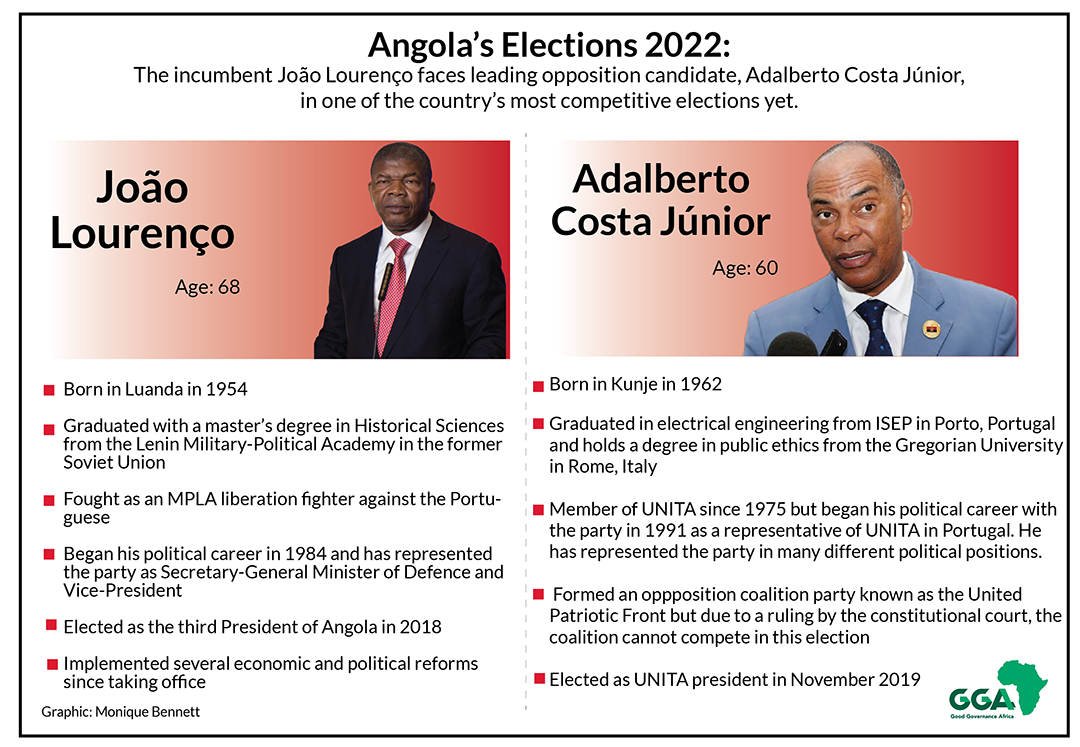
Election contenders
- In May 2022, the Angolan constitutional court ruled that the coalition party, the recently formed United Patriotic Front (FPU), would not be included on the ballot in the upcoming elections. The FPU included the main opposition party UNITA and other key parties such as Angolan Renaissance Party – Together for Angola (PRA-JA Servir Angola) and Democratic Bloc (BD) as well as some organised civil society groups.
- Adalberto Costa Júnior of UNITA was elected as leader in November 2019 and has been a fierce critic of the ruling MPLA and its recent reforms. UNITA won 26.7% of the vote in the previous 2017 election but hopes to improve its margins significantly due to the increase in voter eligibility laws.
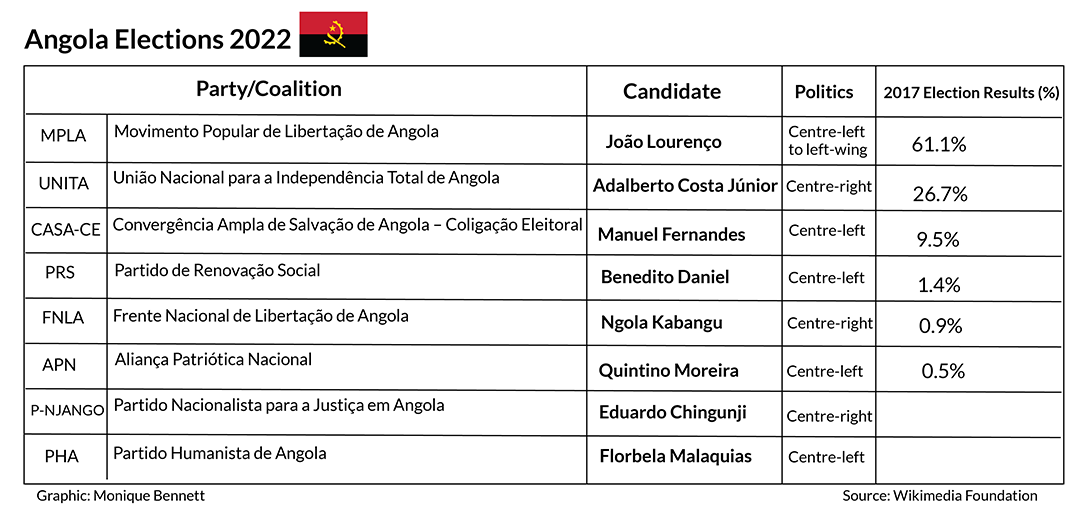
Latest election developments
- Election campaigning commenced on 25 July and has taken place countrywide, with parties presenting their governance programmes for the next five years. Opposition parties have focused on the following issues such as social housing, social protection system, improved long-term economic planning, courts of law re-structuring, corruption, inclusivity, and improving the agricultural and fishery industries.
- UNITA announced it had filed criminal complaints against the National Electoral Commission and the Ministry of Territorial Administration to the country’s Attorney General’s Office over alleged election law violations. According to UNITA, the non-publication of the country’s voters’ roll 30 days before election day, and the lack of database auditing is a serious violation of the electoral process.
- A recent survey questioned Angolans on their trust in the National Electoral Commission, which has declined to an all-time low, with just 21% of citizens indicating they trust the electoral management body.
Vote counting and election processes
- Controversial Spanish company Indra will oversee the electoral process and provide the electoral paraphernalia for this election.
- To mitigate possible election fraud, UNITA plans to set up alternative vote-counting infrastructure.
- According to an official statement, there are 14 million registered voters, 13,000 polling stations, and 26,000 polling units.
Economic challenges
- Since taking office, Lourenço has made several economic and political reforms to attract investment from new strategic international partners, as well as to improve the business environment of the country.
- Lourenço has driven a privatisation campaign to sell off 195 state-owned assets to counter the massive debt from years of borrowing for large infrastructure projects.
- Fighting corruption has been integral in Lourenço’s political reform policy resulting in the dismissal of several high-ranking government officials and civil servants.
- In recent years Angola’s economy has struggled against low commodity prices coupled with the impact of the COVID-19 pandemic. In 2021, its debt to GDP ratio peaked at 132 percent. Economic forecasts suggest that this debt/GDP ratio will fall rapidly as the economy stabilises from fiscal surpluses and improved currency value.
- Despite an expected increase in GDP over the next decade, GDP per capita is still expected to decline. Economists attribute this to the lack of education and health provisions as well as the economy’s heavy reliance on the oil sector.
International election observer participation
- Angola has invited observers from the African Union (AU), Southern Africa Development Community (SADC), Community of Portuguese Language Countries (CPLP), European Union (EU), and the Episcopal Conference of Angola and São Tomé (CEAST).
- SADC deployed the Electoral Advisory Council (SEAC) on 9 March 2022 on a post-election goodwill mission to follow up on the implementation of recommendations by the SADC electoral mission of the previous general elections in 2017.
- The SADC Electoral Observation Mission (SEOM) is expected to be deployed.
- Mozambique will lead the Observation Mission of the Electoral Commissions Forum of Southern African Countries (ECF-SADC).
- The EU announced its readiness to deploy an election observation mission. The Director-General for Africa, Rita Laranjinha, met with government and the main political parties in June 2022 to discuss areas of cooperation and said they await a formal invitation for the upcoming elections.
- The African Union is yet to announce an election observer mission.




